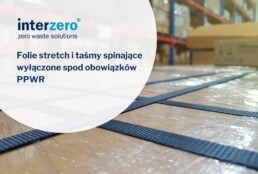
Stretch films and strapping tapes exempted from the obligations of the PPWR
The European Commission has confirmed that stretch films and PET/PP strapping tapes will be fully exempted from the 100 per cent reuse obligation introduced by the PPWR. The EC's decision was announced by the European Film Producers' Association (EuPF), which has long sought an exemption for certain types of transport packaging from the objectives of Article 29(1), (2) and (3) of the PPWR.
Lack of environmental benefits and high implementation costs determined the exclusion of the
As EuPF points out, the EC's recent decision is a 'pragmatic recognition of economic realities'. It was underpinned by the findings of a Deloitte feasibility study commissioned by the European Commission's Directorate-General for the Environment (DG ENV). It showed that switching to reusable stretch films and pallet strapping tapes involves a significant increase in investment and operating costs, with no environmental benefit.
It should be emphasised that the exemption applies only to obligations under Article 29(2) and (3) PPWR regulation. EuPF reported that the decision has already been confirmed and will soon be formally adopted by means of a delegated act. The question of Article 29(1) is still open., which mandates the reuse of 40% of transport packaging in cross-border trade by 2030 and as much as 70% by 2040.
MEP intervention and EC position on the application of Article 29.
The problem of the impending implementation of the mandatory reuse of stretch film and strapping tapes was also recognised by MEP Piotr Müller (ECR), who sent an enquiry to the EC regarding the planned exemptions as early as mid-August 2025. As he stressed, maintaining the current obligations "would mean eliminating common solutions such as stretch film and PET tape, despite their low carbon footprint and high logistical efficiency, as confirmed by independent studies (e.g. IFEU 2025)". In his view the failure to fully exempt stretch film and binding bands from Article 29(1), (2) and (3) of the PPWR is promoting less environmentally friendly solutions, which in turn runs counter to the objectives of the PPWR Regulation. Müller also pointed out that the process of developing the delegated act, which could introduce possible exemptions, was taking place without sufficient transparency and without consultation with the packaging industry.
19 September 2025. The EC responded to the enquiry by stating that it was investigating the possibility of exempting certain packaging formats from Article 29(2) and (3) of the PPWR and awaiting the results of the study to make a final decision. While, in the case of the above provisions, the EC's final decision turned out to be in line with the wishes of the industry and with environmental performance in the broadest sense, already at Article 92(1), the positions of the industry and the EC differed significantly. In the aforementioned response to the enquiry, the EC made it clear that:
"the targets for the re-use of transport packaging formats listed in Article 29(1) of the Packaging Regulation are feasible, do not worsen environmental performance and do not lead to negative economic impacts for the economic operators concerned."
In view of these reports the exemption of stretch film and PET/PP tapes from Article 29(1) of the PPWR has been called into question.
IFEU and RDC data: reuse not always greener
Introducing mandatory reuse in cross-border transport (i.e. no change to the provisions of Article 29(1)) would mean that two palletising systems would have to be used - separately for the EU market (reusable packaging) and export (non-reusable packaging) - and this could undermine the competitiveness of European industry. Moreover, transporting empty reusable packaging over long distances, which is typical of cross-border trade, would significantly increase CO₂ emissions..
According to EuPF head Thomas De Meester, scientific and economic data support that Article 29(1) should also be exempted:
IFEU analysis shows that in many applications, reusable packaging leads to as much as 1700% higher greenhouse gas emissions, and the RDC study shows an annual cost increase of almost €5 billion in eight key sectors. With longer transport distances, emissions increase, making reuse less environmentally beneficial.
Importantly, in considering the legitimacy of the exemption, the EC is relying on the same set of scientific data, a fact that clearly resonated in its response to Peter Müller's query.
At the same time, the Commission announces a "realistic and pragmatic approach" to the development of an Article 30 implementing act that will define the methodology for calculating re-use rates. The industry looks forward to seeing what specific criteria will be adopted therein.
Industry awaits implementing act and public consultation
The European Commission's decision to exempt pallet wrapping film and strapping tape from the 100 per cent reuse target is an important signal for the plastics industry across Europe - also in Poland. Many Polish companies are active on the export market and the potential reuse obligation could force a costly reorganisation of packaging and logistics processes.
EuPF announces further efforts to harmonise the Commission's approach to all paragraphs of Article 29 and to actively participate in the consultation on the Article 30 implementing act. The organisation stresses that regulations should be based on science and not solely on political assumptions, so that they realistically support environmental objectives and a circular economy.
Sources:
- The exclusion of stretch wrap and PET tape from the reuse obligation in the draft packaging and packaging waste regulation (PPWR) and the transparency of the consultation process, https://www.europarl.europa.eu/doceo/document/E-10-2025-003229_EN.html
- Answer given by Ms Roswall on behalf of the European Commission, https://www.europarl.europa.eu/doceo/document/E-10-2025-003229-ASW_EN.html
- EuPF welcomes EU reuse exemptions, https://www.recyclingtoday.com/news/eupf-plastic-film-pallet-wrap-strap-reuse-mandate-exemptions-europe/
- Stretch films and tapes exempt from reuse. What's next for PPWR?, https://www.plastech.pl/wiadomosci/Folie-stretch-i-tasmy-zwolnione-z-ponownego-uzycia-Co-21346